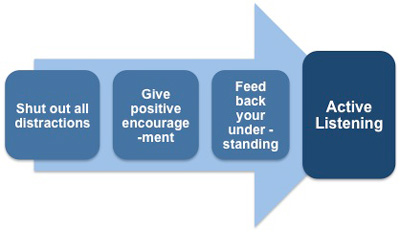The Skills Required to Chair a Meeting
It is important that the meeting Chair has the respect of the other participants in the meeting, as they will need to defer to the Chair even on occasions where they have strong views about the matters under discussion.
The role of the Chair can be very demanding, especially where a meeting is dealing with contentious issues, and will test your communication skills to the full.
 |
A good Chair needs to demonstrate a broad spectrum of skills, including: diplomacy, attentiveness, decisiveness, adaptability, assertiveness, and impartiality.
Active Listening
One of the most important skills you will require to become a good Chair is that of 'active listening.' Active listening involves concentrating one hundred percent on the attendee who is speaking and remaining attentive to what is being said, no matter what distractions may be present. You must focus all your energy on the content of the message, taking into account subtle signs given off by the speaker through their tone and body language.
It is vital you shut your mind to formulating your own response or acknowledging your own emotions whilst the conversation is underway. You will be better able to absorb the full meaning of the communication by listening to it in its entirety and only then preparing your response. This enables you to demonstrate your ability to be concise and persuasive to others in the meeting.
A simple technique to keep you focused on the conversation and show that you are listening to what is being said is to use your facial and head movements. For example a nod of the head, eye and eyebrow movement, a smile of acknowledgment - whatever is most appropriate. You can also verbalize that you are concentrating on what is being said by uttering an 'OK,' 'Uh huh' or something similar.
The reason that active listening is so important is because the behavior of the Chair has such a big influence on the behavior of the other attendees. If the Chair remains fully engaged with the speaker, then most of the other participants will do likewise and listen carefully rather than becoming distracted. Active listening also makes the speaker feel that their contribution is valued. This can be a decisive factor in making the meeting a positive experience for some of the less confident attendees.
In your role as Chair it is your ability to accurately paraphrase what you have just heard into a coherent statement that most actively informs the speaker and the other participants that you have heard what they have actually said. It will also demonstrate that you have been impartial and decisive in your statement. Typically you could say something along the lines of
'So the key issue we need to address is …… do you agree?'
'Can I summarize by saying that the best way forward is … … is everyone happy with that?'
'From all that has been said so far the main obstacle is …...?'
 |
You will also be able to better control interruptions and diversions within the meeting by utilizing this technique to draw an agenda item to a timely close. It is a structured and positive way to be assertive and retain control of the meeting.
Assertiveness and Diplomacy
You will need to be able to maintain control to ensure that progress is made in line with the schedule - as defined in the agenda. The Chair should always aim to strike a balance between hearing everyone's views and getting through the business. Ensuring that everyone gets a hearing will almost certainly involve stopping someone from dominating the proceedings and active listening will help this to happen.
The more contentious the issue the more likely it is that you will have to be both assertive and diplomatic to ensure everyone has the opportunity to contribute. You don't need to be rude or dogmatic. Phrases such as 'I think we should hear from Ms. Smith on this' or 'Can we have some comments from the engineering department on this' should be sufficient in most cases.
By making sure that each speaker is able to make their contribution without being interrupted, you will encourage others to listen to what is being said and to consider it carefully before making their own point.
Before chairing a meeting you must assess the relative importance of each agenda item and adhere to the suggested timings. If you feel these should be changed then inform the meeting at the start along with your reasoning.
The important thing is to not find the meeting being derailed as discussions focus on a particular item without reaching a resolution. As Chair it is imperative that you control such discussions before they get out of hand. You need to remind participants of the meeting objective and be decisive in drawing the item to a close.
You may want to have it minuted that you recommend this issue is discussed further at a separate meeting. You could also summarize the discussion so far on a flip chart or electronic white board and say you'll come back to it if there is sufficient time. The downside of this type of resolution is that many participants will feel that the item is unresolved and keep on referring back to it.
Impartiality
Another key attribute for a Chair is their ability to demonstrate that they take an impartial standpoint, seeking out the facts and judging each argument equally and fairly. It is important that you do not routinely use your position as Chair to favor views that support what you may privately consider the best course of action. If you wish to have a motion tabled at a meeting that you are chairing, try enlisting another participant to actually make that point.
In extreme circumstances, you may decide that it is necessary to sacrifice impartiality for what you see as the importance of helping the group decide on a certain course of action. But remember, the main concern of the Chair should be the aims and objectives of the group and the integrity of the meeting process.
Your ongoing effectiveness as Chair will nearly always be more important than your ability to shape the outcome of any single issue. If you become embroiled in a debate you risk losing your credibility and once lost this can prove impossible to regain.
Adaptability
Your ability to relate to and work with a broad cross-section of personalities will be a significant advantage, as you will easily adapt your behavior to draw comments from the diverse group of participants. Add this skill to the one of active listening and you will be able to ensure that everyone, regardless of status, will feel confident to contribute in the meeting.
You may also be interested in:
Chairing a Meeting | Meeting Rules | Chairperson's Responsibilities Before the Meeting Begins | How to Begin the Meeting | Chairperson's Responsibilities During the Meeting | Chairperson's Responsibilities After the Meeting.



